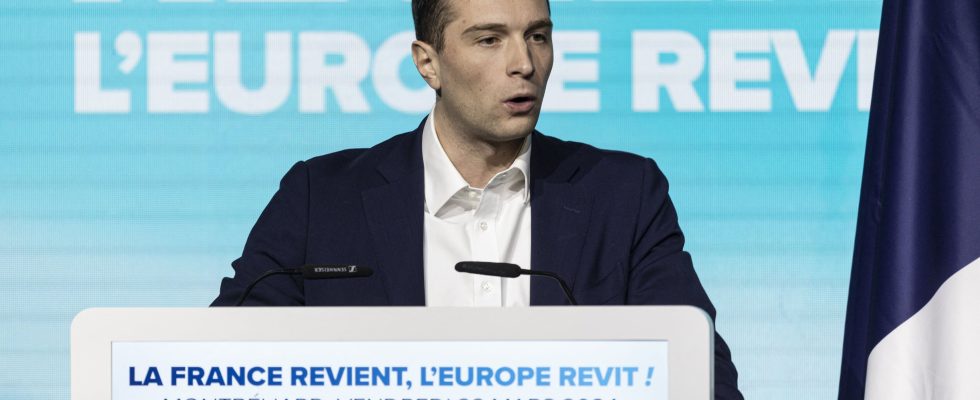A polling curve which, according to studies, stagnates for a long time, slowly decreases a few weeks before the election, then a score which suddenly collapses on the day of the vote count. Another which, over the weeks, gradually rises until it flies away in the final straight. Enough to give a cold sweat, or nourish the hope – it depends – of the various heads of list and other campaign strategists in view of the European elections on June 9. It is François-Xavier Bellamy whose Les Républicains list oscillated between 14% and 13%, until the eve of the 2019 election, finally obtaining only 8.48% of the votes. Or on the contrary, Yannick Jadot that same year, constantly tested below 10%, who achieved a score of 13.48% of the votes cast. Because such is the reputation of this deadline: the fate of the Strasbourg aspirants would only be decided at the very end of the campaign.
This reputation has the appearance of an iron rule. Already twenty years ago, the polling commission warned about this phenomenon in a report: “With regard to these elections for which the political offer crystallizes later than during national elections, the fluidity of the electorate is indeed considerable”, wrote the magistrates in 2004. Thus, an Ifop survey carried out on voting day in May 2019 indicates that 39% of voters had made up their minds in the week preceding the vote; 7 points more than during the first round of the 2022 presidential election (32%).
“The dynamic does not concern all applications”
“It’s a constant during this type of election: the vote crystallizes late,” says Jean-Daniel Lévy, deputy director of the Harris Interactive France polling institute. Firstly because the French do not know as well the campaign issues than during national elections. Also because it is a type of election where we do not always perceive the profound changes that the result would imply. Finally, the election is much less publicized than others , the big debates arrive at the very end of the campaign.” The large number of lists, specific to the European ballot, would also contribute to the late choice of voters. “These elections, without a direct issue of power, open an electoral accordion with a multitude of political offers. The French feel more authorized to express ‘mood votes’: the vote is more unstable, therefore decided later”, explains Brice Teinturier, Deputy Managing Director of Ipsos.
But the dynamic would not concern all applications. “Things are structured upstream and are stable, nuance Brice Teinturier. As in 2019, where we clearly perceived that the leading match between Jordan Bardella (RN) and Nathalie Loiseau (LaREM, ex-Renaissance) would be played at one or two points”, continues the latter. So, in the latest survey Ifop of March 25, 2024, 83% of respondents intending to vote for the list of Valérie Hayer (Renaissance) are sure of their choice. The percentage rises to 87% for those who plan to vote for the Marinist candidate. Well beyond the 75% of voters on average sure of their choice.
Yet in 2019, it was less than two weeks before the vote that the National Rally list took precedence over the Macronist candidacy, almost systematically ahead. Jordan Bardella will end up winning with 23.42% of the votes, compared to 22.42%. Same logic five years earlier, for the 2014 election. Neck and neck, the UMP and FN lists, respectively led by Jean-François Copé and Marine Le Pen, will compete for first place in the polls until the beginning of the month from May; moment when the party with the flame will widen the gap with the right. Marine Le Pen will finish four points ahead of her competitor. Suspense, when you hold us…
“The usual pattern could be undermined”
What if this tenth European election ended up deviating from the rule? This is what some pollsters and other researchers seem to think. “Usually, European campaigns are extremely short. That of May 25 and 26, 2019 really began on May 8 of the same year. This explains the very strong movements of the last few days. The next election takes place in June, with many public holidays in May; there will therefore be a big month of campaigning, explains Frédéric Dabi, Director General of Ifop. This is the only national election of the five-year term, Emmanuel’s real last meeting Macron: this can have an effect. Finally, we often talk about these elections as a vote without incarnation, but we have many heads of outgoing lists. All these factors would encourage us to say that the usual pattern could be undermined.”
The campaign will certainly be longer, but beware of exogenous elements which could well strengthen the performance of certain lists in the final days. In 2009, the Europe Écologie – Les Verts list led by José Bové and Daniel Cohn-Bendit struggled for several months to exceed the 10% threshold, and reached, on June 4, between 12% and 15.5% of voting intentions. after several polling institutes. On Friday evening, France 2 broadcasts the documentary Home – an ode to the planet – by Yann Arthus-Bertrand, which attracts 8.3 million viewers. The Greens will ultimately obtain a score of 16.28% of the votes. “That we have favored the situation, certainly. Now, it is a date chosen two years ago, June 5,” said the director at the time, while several political leaders accused the channel of playing into the hands of environmentalists . On June 5, 6 and 7, France will celebrate the 80th anniversary of the Landing of Allied troops, in the presence of American President Joe Biden. Emmanuel Macron should probably speak on the Normandy beaches. An ideal telescoping, three days before the election, to target the National Rally one last time.
.
